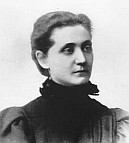 |
| Jane Addams 1860-1935 (C. P. Gilman also 1860-1935) + Hull House "Settlement House" |
 |
Jane Addams enters consideration with Utopias as co-founder in 1889 of Hull House, a "settlement house" serving newly urbanized families in Chicago that resembles in some respects an "intentional community."
Addams, like Charlotte Perkins Gilman, represents an early generation of American women professionals in the Progressive Era. They were among the first to benefit from higher education, particularly in human or social sciences like Sociology, Psychology, Anthropology, and Economics. Finding few professional opportunities, these women often created their own opportunities to work and continue their studies.
Born to a prosperous Illinois family whose father was a friend and supporter of Abraham Lincoln, Addams suffered from tuberculosis and spinal ailments as a child that affected her adult health. She read widely and, inspired by English novelist Charles Dickens's depictions of poverty, intended to become a medical doctor. She received her B.A. from Rockford Female Seminary in 1881 and, after her father's death, moved with members of her family to Philadepelphia, where she attended the Woman's Medical College of Philadelphia for a year before her own health problems led her to return to Illinois, where she underwent back surgery.
Addams joined the Presbyterian Church and became interested in the communitarianism of the early Christians (Acts 2) and religious writings by Russian novelist Leo Tolstoy, who advocated and embodied a form of Christian pacifism and asceticism.
In the late 1880s Addams traveled in Europe with her Rockford friend Ellen Gates Starr, visiting settlement houses including Toynbee Hall in London's East End, which provided social services to the poor and displaced. Her letter to her sister Alice described it as "a community of University men who live there, have their recreation clubs and society all among the poor people, yet, in the same style in which they would live in their own circle. It is so free of 'professional doing good,' so unaffectedly sincere and so productive of good results in its classes and libraries that it seems perfectly ideal."
A native of Illinois, Addams co-founded Hull House in 1889 and served as head resident until her death. By 1920, the United States had almost 500 settlement houses, which provided a "safety net" in the generations before Social Security and related programs were established in the New Deal of the 1930s. Hull House and other settlement houses also became bases for activists advocating public policy reforms.
Nobel Prize biography (Addams won the 1931 Nobel Peace Prize primarily for her peace activism before and during World War 1.)
Jane Addams: Hull House Museum
Swarthmore College exhibit on Jane Addams
CBS / AP report 2012: Hull House closes (after 122 years)
Wikipedia on Settlement Movement
Discussion question: How may Settlement Houses serve as a potential topic for a seminar in Literary and Historical Utopias? Does the concept of utopia get stretched too far or overused, or do enduring activist examples help to ground the concept in social history?
If Hull House is "utopian," what features can be identified as typical of other literary utopias and historical intentional communities?
How much does the issue of "immigrant assimilation" play into or distract from utopian subjects?

Hull House, Chicago

Jane Addams, left, in courtyard at Hull House